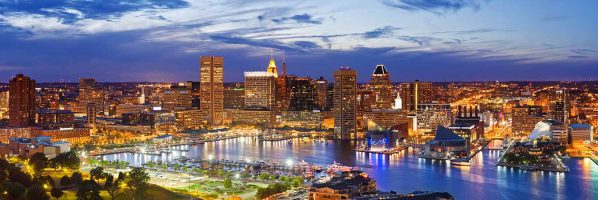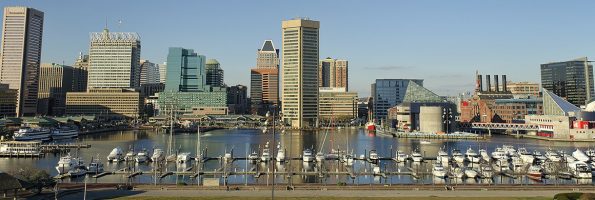Johns Hopkins Carey Flex MBA: 5 Questions with Adcom

In our latest installment of the MetroMBA “5 Questions” series, we speak with Dan Jansson, the Marketing Coordinator at Johns Hopkins Carey School of Business about the Johns Hopkins Flex MBA.
How does the Johns Hopkins Flex MBA differentiate from other offerings at your school and other programs in the GME space?
The Flexible MBA from Johns Hopkins Carey Business School has the perfect format that fits your busy life to make the perfect MBA program for you. Choose from six unique concentrations, and take your classes online, on-site, or a combination of both. You can also choose a pace that works for you and graduate in fewer than three years, or take up to six years.
What is the typical profile of a student who would benefit most from the program and what characteristics are your admissions team looking for?
While the Flexible MBA program is able to adjust to almost any schedule, on average our students have 11 years of work experience.
What types of financial aid are available to students?
Carey Business School offers numerous options for financing your education, including scholarship aid, loans, payment plans, and tuition reimbursement available to those who qualify.
How does your school assist in finding job opportunities and how do you enhance a student’s profile as a job applicant?
All Flexible MBA students have the opportunity to take advantage of Carey Business School’s Career Development Office which features a career navigator, webinars, professional image workshops, networking events, and much more! A degree from Johns Hopkins will also open up access to the expansive alumni network to help enhance your profile as a job applicant.
What is one insider tip you can provide prospective applicants about applying?
Support your application with a strong GMAT/GRE score for your best chance at admissions and merit scholarship opportunities for the Johns Hopkins Carey Flex MBA.
How Affordable are Baltimore MBA Programs Compared to DC?

A few years ago, the Baltimore Sun published a hilarious list outlining 100 reasons why Baltimore is a better city than Washington DC. Here are some of our favorite reasons:
- We don’t start conversations by asking, “What do you do?” or “Who do you work for.”
- It never takes us 45 minutes to go six miles.
- Our traffic doesn’t lead to clinical depression.
- D.C.’s happy hour is regular price to us.
- Our signature food is crab cakes and pit beef. D.C. has … yeah.
- We weren’t built on a swamp.
- Cal Ripken is 2,632 times better than any D.C. sports figure.
- The NATIONAL Aquarium: Not in the nation’s capital.
Yes, some of these reasons are very tongue-in-cheek, and the list aimed to be light-hearted and irreverent. But if you’re a prospective MBA in the DMV, there are some clear advantages to picking a business school in the Baltimore metro over the Washington DC metro, namely the affordability of programs.
Let’s take a deeper dive and see just how affordable Baltimore MBA Programs are compared to their DC counterparts.
Which MBAs Can You Earn in Baltimore and DC?
Both Baltimore and Washington DC are home to some of the country’s most prestigious business schools and MBA programs. Programs offered in the Baltimore metro include:
- Perdue School of Business – Salisbury University
- Carey Business School – Johns Hopkins University
- Sellinger School of Business – Loyola University Maryland
- University of Baltimore – Merrick School of Business
- University of Maryland R.H. Smith School of Business
Meanwhile, MBA programs offered in the Washington DC Metro include:
- George Mason University School of Business
- George Washington University School of Business
- Howard University School of Business
- Kogod School of Business – American University
- McDonough School of Business – Georgetown University
How Affordable are Baltimore’s Programs Compared to DC’s?
Yes, both metros boast and impressive programs that are sure to provide prospective MBAs with a high-quality business educations, but which city offers the more affordable options?
Here is the average cost per credit hour at business schools in Baltimore.
- Carey Business School Global MBA: $2,174 per credit hour
- Perdue School of Business Full-Time MBA: $392 per credit hour (in-state students), $703 per credit hour (out-of-state students)
- Sellinger School of Business Full-Time MBA: $1,238 per credit hour
- Merrick School of Business Flexible MBA: $824 per credit hour (in-state students), $1,149 per credit (out-of-state students)
- R.H. Smith School of Business Full-Time MBA: $1,658 per credit hour (in-state students), $1,998 per credit (out-of-state students)
Let’s compare these tuitions rates to the MBA offerings in the Washington DC area:
- George Mason University School of Business Full-Time MBA: $950 per credit hour (residents of Virginia, Maryland, and Washington DC), $1,751.50 per credit hour (out-of-state and international students)
- George Washington University School of Business Global MBA: $1,837 per credit hour
- Howard University School of Business Full-Time MBA: $1,259 per credit hour
- Kogod School of Business Full-Time MBA: $1,642 per credit hour
- McDonough School of Business Full-Time MBA: $1,880 per credit hour
When looking at tuition costs, Baltimore takes the cake. Even though Baltimore boasts the most expensive full-time program (Carey Business School Global MBA), the average cost per credit hour for both in-state and out-of-state students is about 16 percent lower in Charm City.
Washington DC vs. Baltimore MBA Cost
| Baltimore | Washington DC | |
|---|---|---|
| In-State Cost (per credit hour) | $1,257.20 | $1,513.60 |
| Out-of-State Cost (per credit hour) | $1,452.40 | $1,673.90 |
Additional Costs To Consider
Aside from tuition, business students living in the Baltimore area have a lower cost of living then their Washington DC counterparts. According to Numbeo, you would need around $4,541 in Baltimore to maintain the same standard of life that you can have with $6,100 in Washington DC, assuming you rent in both cities. This calculation uses the website’s Cost of Living Plus Rent Index to compare cost of living.
Here’s a closer look at how Numbeo creates its Cost of Living Indexes, and a breakdown of a few key stats to look at when comparing Baltimore to Washington DC:
- Consumer Prices in Baltimore, MD are 14.78 percent lower than in Washington DC
- Rent Prices in Baltimore, MD are 39.97 percent lower than in Washington DC
- Groceries Prices in Baltimore, MD are 15.70 percent lower than in Washington DC
- Local Purchasing Power in Baltimore, MD is 10.21 percent lower than in Washington DC
The case for Washington DC
So Baltimore’s MBA offerings are, on average, more affordable than Washington DCs. But what if money isn’t an issue, or you happen to get into a program in DC? Here are a few ways that the Capital City has the Monument CIty beat, according to Thrillist:
- Culinary Scene: DC is experience a craft beer renaissance with four breweries opening in recent years: DC Brau, 3 Stars Brewing, Chocolate City, and Bluejacket (soon). Meanwhile, notable restaurants such as minibar (Andres), Le Diplomate (Starr), Kapnos (Isabella), Range (Voltaggio), and Casa Luca (Trabocchi) have also opened. Baltimore isn’t really known as much of a foodie town.
- Public Transit: The Metro is one of the most efficient, most convenient, and cleanest public rail lines in the country. Baltimore’s metro runs East to West only, and doesn’t link up with either of the two other rail systems.
Oh, and remember that Baltimore Sun article we reference at the top of the page? Enjoy DC Inno’s slightly more punchy response.
What are the Best Marketing MBA Programs in Baltimore?

The Baltimore metro is home to over 2.7 million people, making it the 20th largest metropolitan area in the United States and the economic center of the state of Maryland. Best known for its top colleges and universities, hospitals, sports, and professional and financial services, Baltimore is also a popular meeting and convention destination, according to Visit Baltimore. Continue reading…
Carey Professor Wins Johns Hopkins Catalyst Award

The Johns Hopkins Carey School of Business announced that Jemima Frimpong, an Assistant Professor of Management and Organization, is a recipient of the university’s annual Catalyst Awards. Continue reading…
Looking For The Best Baltimore Finance MBA Programs

The finance industry has always gone hand-in-hand with the MBA degree. Even as these advanced business degrees are becoming increasingly popular in other industries, finance is still the biggest MBA job sector in many metros and accounts for 22 percent of all MBA jobs according to a recent QS TopMBA.com Jobs and Salary Trends Report. Continue reading…
Carey MBA Students Honored at Annual Student Recognition Reception

Each year, the Carey Business School honors stand-out students and organizations at the Annual Carey Student Recognition Reception. The ceremony is headlined by five major individual student awards: Mission in Action Award, Carey Networking Award, Carey Brand Ambassador Award, Carey Community Build Award and Carey Leadership Excellence Award. Continue reading…
